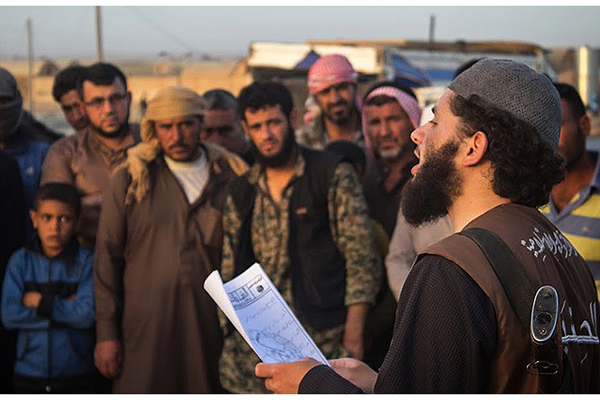
By Molly Jackson
Politicians, media, and readers from New York to Damascus have debated what, exactly, to call Islamic State, a radical Islamist group that controls a vast stretch of Syria and Iraq while inspiring terror around the globe. IS. ISIL. ISIS. Daesh. But to its affiliates, a single name now suffices, according to The Economist: the State.
The dawning realization that Islamic State is actually intent on establishing a “caliphate” for the world’s Muslims is underscored by a 24-page state-building manual leaked to The Guardian, which experts say should carefully guide Western nations’ response to an increasingly global fight against the group’s terror both at “home” and abroad.
“If the west sees [Islamic State] as an almost stereotypical band of psychopathic killers, we risk dramatically underestimating them,” retired Gen. Stanley McChrystal told the Guardian, comparing the group’s strategies to Mao Zedong and the Viet Minh.
The document’s detailed plans for a full-fledged state, outlining an educational curriculum, propaganda, and an oil and gas-based economy, were penned for administrators between July and October 2014, soon after leader Abu Bakr al-Baghdadi declared a caliphate in northern Iraq and Syria.
Their message has convinced many to move to that territory, persuaded in part by Islamic State’s pitch to live “with might and honor” in this Middle Eastern region, rather than “homeless” abroad.
Once there, fighters enter an organized system of military camps, including “refresher” camps for veterans, as outlined in the leaked manual. But departments also exist for nearly all aspects of civilian life, including a treasury, health care, and employment services.
The document also confirms Islamic State’s intent to indoctrinate children through curriculum and training some young boys for combat, a future-facing emphasis one Kurdish security official interviewed by The New York Times called “a ticking time bomb.”
The self-declared caliphate “is a project that strives to govern. It’s not just a case of their sole end being endless battle,” academic Aymenn al-Tamimi, who has quickly become a leading expert on Islamic State, told the Guardian. Mr. Tamimi released the manual to the British newspaper after receiving it from an anonymous source.
Analysts say that it is state-building, more than terrific violence, that sets Islamic State apart from competing or preceding terror groups like Al Qaeda.
“There is no question that the way to look at it is as a revolutionary state-building organization,” Harvard professor Stephen M. Walt told The New York Times in July. Dr. Walt was among the first experts to push back on the assumption that Islamic State’s horrific tactics would doom its long-term success, arguing that a broader foreign attack is needed to curb its growth.
“The terrorist threat has evolved into a new phase,” President Obama told the nation Sunday night in a rare Oval Office address, referencing attacks like last week’s shooting in San Bernardino, California, whose attackers are thought to have been radicalized and to have pledged support to Islamic State. The administration has put increased importance on fighting the Islamic State message online.
Anyone hoping to offer Syrians and Iraqis an alternative to Islamic State’s rule must also prove their ability to provide the basic safety and economy that, lacking under other governments, have made many Sunnis grudgingly accept life in the “caliphate.” Yet Islamic State’s propaganda machine may be better at inspiring admiration abroad than at home: many who escape report a broken system short on doctors and other professionals, where heavy taxes are imposed to make up for unsteady business in oil and smuggling. And the relative safety and swift justice the group promises its citizens is only guaranteed for those who avoid angering fighters.
British Lieutenant Gen. Graeme Lamb, who reviewed the Guardian’s document, stresses the importance of bringing other Sunni Muslim states on board the fight against Islamic State’s terror, in order to disprove the extremists’ assertion that they speak for Sunnis worldwide.
Uniting with moderate Muslims, rather than alienating them, is also a trademark of President Obama’s counter-terrorism strategy. “We cannot turn against one another by letting this fight be defined as a war between America and Islam,” he told listeners in Sunday’s address.
CSM

Leave a Reply
You must be logged in to post a comment.